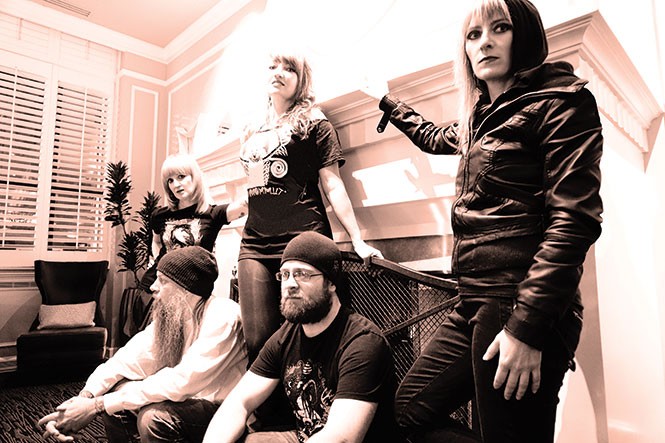
It was surreal, watching Rebecca Vernon perform with SubRosa at CrucialFest last June. On the Metro Bar stage, flanked by band members Sarah Pendleton (violin), Kim Pack (violin), Levi Hanna (bass) and Andy Patterson (drums), she displayed an intensity and seriousness that you don't see offstage.
I flashed back to our first meeting. It must've been 1999 or 2000. On a break from my job at a mortgage company, I called the offices of The Event NewsWeekly, where I freelanced as music editor. I expected to hear my friends and editors, Brian Staker or Jason Matthew Smith, on the other line. Instead, I heard Rebecca.
Her cheery tone caught me off-guard. "Who's this?" I asked. She introduced herself and we chatted for far longer than I was allowed to be away from my desk. Subsequent chats always ran long. What's the flipside of the "insta-bro?" Insta-sis?
That's a lot like "in stasis"—which, inasmuch as that can mean a period of equilibrium, or a sense of calm, fits. We've been in my car, in the lot where the Event office once stood, for four hours. This story is due tomorrow. Rebecca faces a crunch at her day job before punching out and racing to Las Vegas to film a music video with actor/director Thomas Dekker (Heroes, the upcoming film Jack Goes Home). We're alone in a dark, sketchy neighborhood, but we're content to ride tangents as time ticks away.
I learned early on that Rebecca is Mormon, playing the organ in church every week, as well as drums. Over the years, I watched her style edge from "Molly Mormon" to something more gothic. She joined erstwhile City Weekly music editor Bill Frost in his band Spork, played with the all-female punk band Stiletto and co-founded goth-ish shoegazers Violet Run. As she became more of a rocker, she remained sweet and upbeat—and ironically, I thought—a faithful church member.
When life pulled me away from covering local music, I experienced only snapshots of SubRosa's genesis: Watching Bad Brad Wheeler and Dan Weldon of the Legendary Porch Pounders give Rebecca guitar lessons at the airport terminal in Austin, Texas. Rebecca introducing me to Pendleton, and telling me a bit about SubRosa's emerging sound, centered around those violins. We lost touch.
I completely missed their first three recordings, and all of their shows. It wasn't until I stumbled upon the band's 2008 album No Help for the Mighty Ones on YouTube that I heard Rebecca's new music. I recall sitting and listening, astounded at the band's innovation on an increasingly rote genre, sad that I missed so much of my friend's life, and proud of her accomplishments.
Stronger than those emotions was my reaction to the music, where the traditional guitar-bass-drums power-trio is augmented by twin electric violins and Rebecca's moody vocals and deep, literate lyrics. I let the music play and submitted to SubRosa, lulled by thunderous rhythms and beautiful melodies alike. I repeat these experiences often, always forgetting to learn the titles of songs and the associated albums.
At a distance, I learned what Rebecca had been up to. She didn't simply front one of Salt Lake City's best and most original bands and sign to an indie label, like a few other SLC acts have done. SubRosa had transcended the "local" scene. They weren't just ours; they belonged to the world. Literally, I discovered, when Rebecca and I reconnected about 18 months ago. SubRosa's chamber-doom sound has fans in Europe and even Russia, where the band gets mobbed for autographs.
The CrucialFest performance—my first SubRosa show—came eight months later. I met Rebecca early. We found a back table and talked and talked, until maybe 30 minutes before show time. When they took the stage, Rebecca's eyes ceased their usual twinkle. Suddenly, she seemed unfamiliar. Then I realized I was simply experiencing another side of her, the part she shares only through her music.
That music. It's hypnotic, yet at once comforting and terrifying, in a way that one figures is similar to how a fish feels when it stares at the bioluminescent lure of an angler fish, just before being torn to bits by razor-sharp teeth. It's a strange and wonderful sensation. For every rumble, crash, caterwaul and wail, there is a sound that washes over and heals you, leaving you simultaneously calm and alive with ache. It occurs to me now that this is the musical distillation of Rebecca's duality, her outer light and inner darkness—a way to engage with her even when she's not around.
When we finally break, Rebecca has shared details of the impact SubRosa's imminent new album, For This We Fought the Battle of the Ages, is already having. It includes an interview with Noisey/Vice about the song "Troubled Cells," which was written in response to suicides caused by her church's bad behavior regarding LGBTQ members. (As I'm writing this, it has almost 500 shares online, 12 hours since it was posted.)
Rebecca puts physical copies of three of their albums, including For This, in my hands. We say goodbye, for now. I'll hear her tomorrow when I go for a drive with my new SubRosa experience.